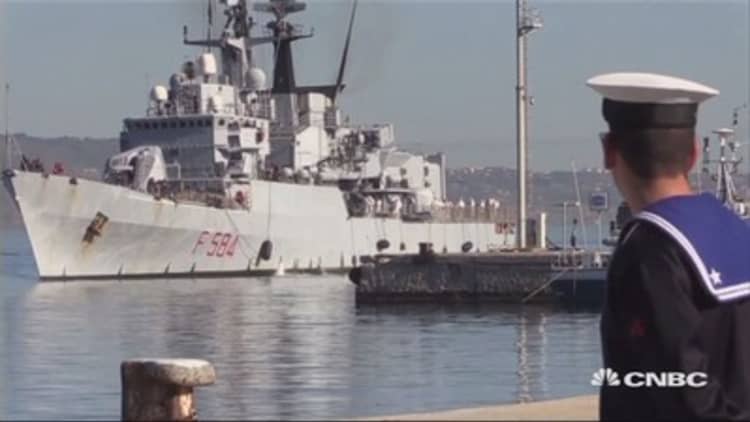Europe's efforts to confront the migrant crisis in the region have been dubbed "a disaster" by the controversial leader of the U.K. Independence Party (UKIP).
Speaking to CNBC in Brussels on Friday, UKIP leader Nigel Farage told CNBC that yesterday's late-night discussions on how to tackle the growing numbers of migrants trying to reach Europe were "a disaster" for European officials, who wanted to see the responsibility for migrants shared among EU countries.
"(The talks were) a disaster for European Commission President Jean-Claude Juncker," Farage said.
"He has started to implement the EU's common asylum policy...and it's based on burden-sharing, which means that any migrants that arrive in Greece and Italy will be accepted there could then be shared out among the other countries in the EU -- but the message last night was clear that the answer (to that policy) from northern Europe was 'no'."
Farage said this showed there was no "collegiate spirit among the European Union at all" noting that there was a "north-south split over migration."
UKIP is one of a number of rightwing, anti-immigration parties on the rise in Europe where pockets of voters are reacting against a dramatic upswing in the number of migrants arriving, many due to conflicts and wars in their home countries, mainly in Africa and the Middle East.
Farage said that "all across northern Europe, electors are voting for parties who are saying 'we are not prepared to go on accepting limitless number of migrants and, frankly, I think Mr Juncker's common asylum policy is holed below the waterline."
Farage's comments come after fractious discussions between European leaders Thursday evening over how to handle over a migrant crisis in the Mediterranean where leaders found themselves sparring for seven hours about whether to take in 40,000 Syrian and Eritrean asylum seekers now in Italy and Greece and another 20,000 people currently outside the EU.
They eventually agreed a voluntary scheme, sticking to the 60,000 number but granted an exclusion for Hungary, which earlier described the plan as absurd, as well as for Bulgaria, one of the EU's poorest countries.
"It was a very intensive debate," German Chancellor Angela Merkel told reporters after the meeting ended, describing the migrant crisis "as the biggest challenge I have seen in European affairs in my time as chancellor".
Expressing his frustration, Commission President Jean-Claude Juncker described the plan as one of "modest ambition" and said at one point in the meeting he had told EU leaders "I don't give a damn" about objections to the plan's underlying methodology.
"We have to find out if the system works. It doesn't matter if it is voluntary or mandatory, it is whether it can help 60,000 refugees," Juncker told a news conference in the early hours of Friday.
However, the EU's chief executive had been hoping to set a precedent for Europe-wide action that limited national opt-outs.
British Interlude
During the summit dinner, Italian Prime Minister Matteo Renzi rebuked his fellow leaders for their reluctance to support a plan that was meant as an emergency response to the tragedy of 2,000 migrant deaths in the Mediterranean year but has been overshadowed by divisions, particularly in eastern Europe.
"If we think Europe is only about budgets, it is not the Europe we thought of in 1957 in Rome," Renzi said, referring to the European Union's founding treaty.
The summit became so tense that a speech by British Prime Minister David Cameron served as an interlude to cool tempers, with the much awaited address to pitch for a new deal for Britain in the European Union reduced to barely 10 minutes.
The mood was a long way from the unity showed by EU ministers in April immediately after the deaths of 900 migrants off the Libyan coast in a single weekend.

While the political deal was a breakthrough, implementing the plan stillfaces hurdles. The criteria to share migrants among member states must be decided by the end of July. Such factors as the size of a member state's economy and population must be considered.
"There's much, much more argument to come," said one senior EU diplomat. "I don't yet see the full way forward."
Slovakia, Hungary and others fought against, arguing their ex-Communist economies still lacked the capacity to cope.
The debate has also strained the EU's commitment to its Schengen agreement on passport-free travel.
This week, Austria threatened to reimpose controls on its border with Hungary and Britain called for more security around the French port of Calais. Britain and Spain want a bigger focus on returning migrants to countries of origin.

